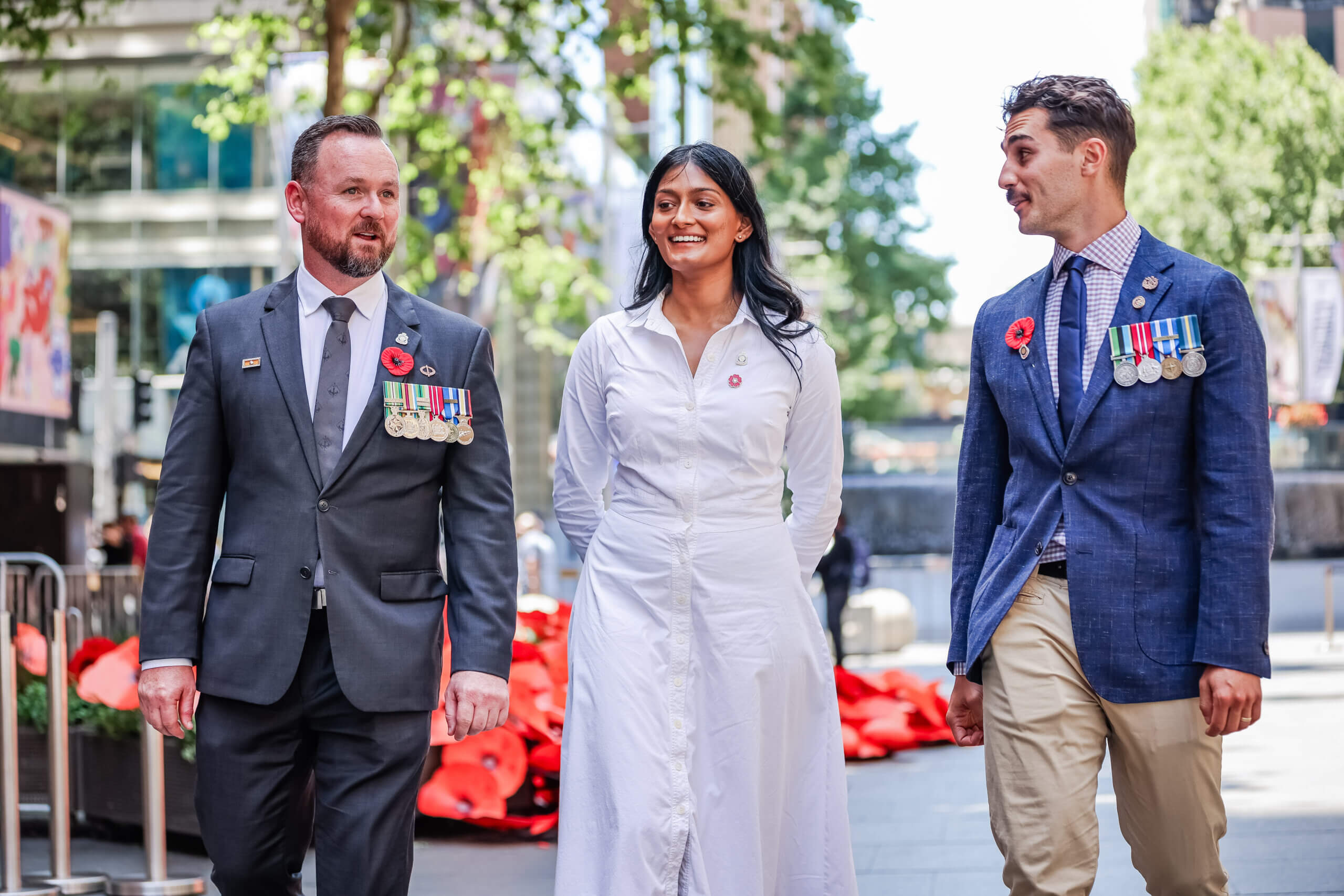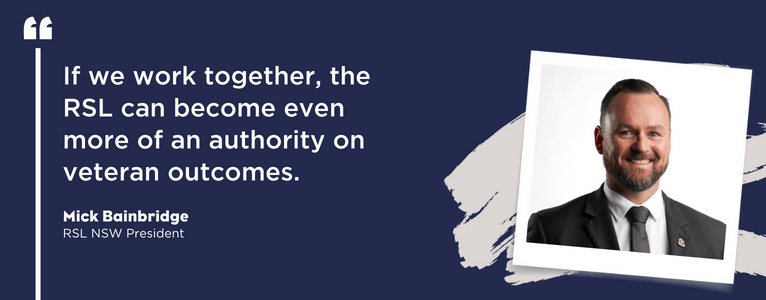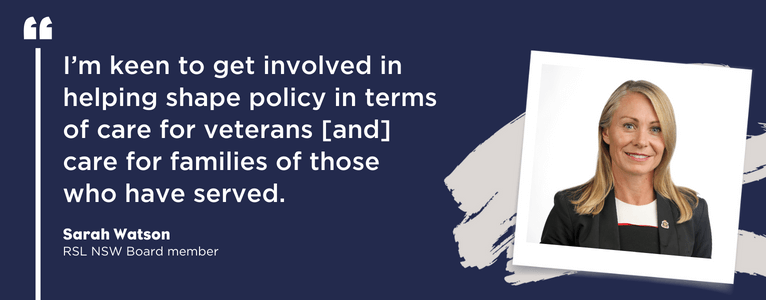Meet two new RSL NSW leaders

New faces in leadership roles across RSL NSW, including new President Mick Bainbridge and Board member Sarah Watson, herald fresh energy and innovation building on years of strategic change.
By Chris Sheedy
At a glance:
- RSL NSW President Mick Bainbridge is looking to use his strategy and management skills to strengthen the League’s policy influence.
- “If we work together, the RSL can become even more of an authority on veteran outcomes,” he says.
- Board member Sarah Watson also has her eyes set on positively influencing policy decisions to support veterans.
- “I’m keen to get involved in helping shape policy in terms of care for veterans, especially around that transition time out of Defence, and policy in terms of care for families of those who have served,” she says.
Having been navigated expertly through several years of change, RSL NSW now stands ready to face the future. Essential to the organisation’s ongoing success is flawless leadership.
In recent months, several new leaders have been announced, from the CEO and President to RSL NSW Board members, RSL NSW Young Veterans Committee (YVC) members and more.
They’re all exceptional individuals with a track record of success and a shared passion for the purpose of RSL NSW. These interests include wellness, support, suicide prevention and advocating on the behalf of veterans to government.
Here, we take a glimpse into the lives of two of those leaders, RSL NSW President Mick Bainbridge and Board member Sarah Watson.
“I need young veterans to come and help me”
Mick Bainbridge’s strategy and management skills, developed during wartime operations and sharpened at university and while practising law, have enabled him to build a successful, veteran-owned law firm that serves the veteran community.
Now, the new President of RSL NSW is looking to use those skills for an entirely new goal: to strengthen the League’s policy influence.
“Working in the law, I see a lot of intersections where there seem to be simple answers, but they get drowned in bureaucracy,” says Bainbridge.
Sometimes, he adds, veterans can feel left behind, and one outcome of this is recent family law legislation defining Commonwealth super for injured veterans as a lifetime benefit, which Mick says could have been handled better by the government.
“This pension is an integral part of the injured veterans’ survival,” he says. “A lot of the people with the most significant injuries are the most vulnerable. They don’t have the ability to earn any other money and this has negatively affected their financial trajectory, making them more vulnerable.
“It was designed to stop veterans falling under the poverty line. But what’s happening now is, if a veteran has a marriage break up, their partner can take half of that pension that’s designed to keep a roof over the veteran’s head.”

It’s one of numerous challenges thrown at veterans. Bainbridge himself has experienced many of them. He has never made a secret of the fact that his transition out of the military could have been better supported by Defence and the DVA.
“There were three things I dealt with when I left Defence,” he says. “One was my injuries, which were significant. Another was the loss of career; I knew nothing else. And the third one was loss of identity. That’s a tall order: to overcome three of those things in one hit.”
Having studied and practised law for more than six years, Bainbridge still doesn’t see himself as a lawyer.
His strongest identity is as a father; his children inspire him to ever greater success. But career-wise, it’s still a difficult task to settle on his new identity, and he’s met countless other veterans who feel the same way.
So why did he take on one of the most important leadership roles at RSL NSW?
“The RSL didn’t know how to help me when I left Defence, but they wanted to help me,” he says.
“The members at Gerringong and Corrimal RSL sub-Branches who took me in, I’m forever grateful for their friendship and support.”
To reinforce the policy-shaping power of RSL NSW, says Bainbridge, the organisation needs all veterans, young and old, to join in and have a voice.
“I need young veterans to come and help me,” he says.
“I can only serve the community that lets me know what they need. So I don’t care if they’re serving. I don’t care if they’re interstate.
“They can help me make the RSL’s voice even more relevant. If we work together, the RSL can become even more of an authority on veteran outcomes.”
“You need to find what drives you”
Sarah Watson’s experience transitioning out of the Army, after more than 18 years, was not a good one. She felt she had failed. She felt she’d let her military colleagues down.
And at the time, the Army was “not very good at supporting members who were transitioning out”, says Watson.
“It was a very challenging time in my life, but it led me on my path. I got involved in volunteering and sharing my story about the challenges I faced on transition.”
The purpose of sharing her story — on top of helping herself cope with post-traumatic stress disorder, suffered after deploying into war zones, and being bullied and sexually harassed in the Army — was to help others who were transitioning out.
“It was to tell them what strategies and organisations I found, and how I navigated that really hard time of transition out of the military after over half my life in uniform,” she says.
It was about how you can, and must, become a civilian overnight without losing your identity.
“That sense of purpose can’t be underestimated,” she said in a documentary called Life After Service: Sarah Watson.
“Especially after transitioning out, you need to find what drives you and gives you purpose, to be able to move forward with your life.”

A great deal of her own success, says Watson, came down to physical fitness. Now the owner of a Yass-based health and fitness business, Watson runs marathons and competes in triathlons.
Not too long ago, the ex-Intelligence Officer and Army Combat Fitness Leader was competing for her country at the Invictus Games and at triathlon events, including the legendary IRONMAN World Championship event in Kailua-Kona, Hawaii.
“I did my first IRONMAN about three years to the day after I was discharged,” Watson says.
“Crossing that finish line after 10 and a half hours of being out there was like, if you can do this, you can do anything.”
When she returned to her home town of Yass after two years in France, Watson sought out the local RSL sub-Branch, at the time mostly populated by Vietnam veterans.
“As the time went on, they realised I was one of them,” she says.
“I continued to turn up and suggested ideas such as family events, and the whole group enjoyed them.
“They started to evolve and open their eyes to the fact that there are heaps of veterans my age group or younger living in the valley, and maybe we should be thinking about them as well.”
In 2021, she became Chair of the YVC, before being voted onto the Board in October 2023.
As a mother who has served, Watson brings a powerful perspective.
“I’m keen to get involved in helping shape policy in terms of care for veterans,” she says, “especially around that transition time out of Defence, and policy in terms of care for families of those who have served.”
A version of this article was published in the December 2023 issue of the Reveille magazine.






